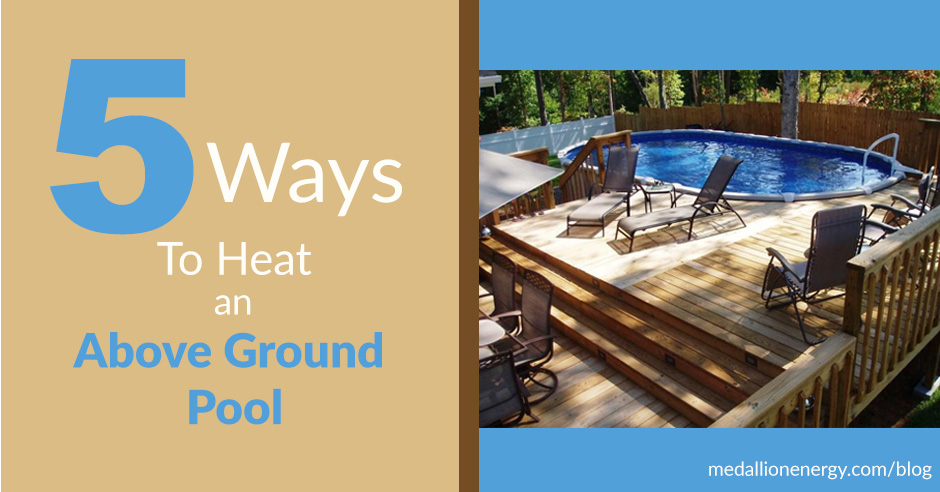You’ve set up your above ground pool. The chemicals are balanced, the water is flowing, and the sun is shining. But there’s one problem:
Despite all that sunshine, the pool is still ice cold.
And not the refreshing kind of cold that makes you feel alive, no. The type of cold that makes you leap 10 feet upwards when your toes touch the water.
So that leaves one question: What’s the best way to heat an above ground pool?
There are a few ways, so if you’re trying to extend your pool season and warm up your pool fast, then keep reading. In this post, we show you 5 different ways to heat an above ground pool.
Regardless of your budget, by the end of the post, you’ll know how to enjoy the warm and refreshing swims you deserve.
5 Ways To Heat an Above Ground Pool Fast
Use a gas heater
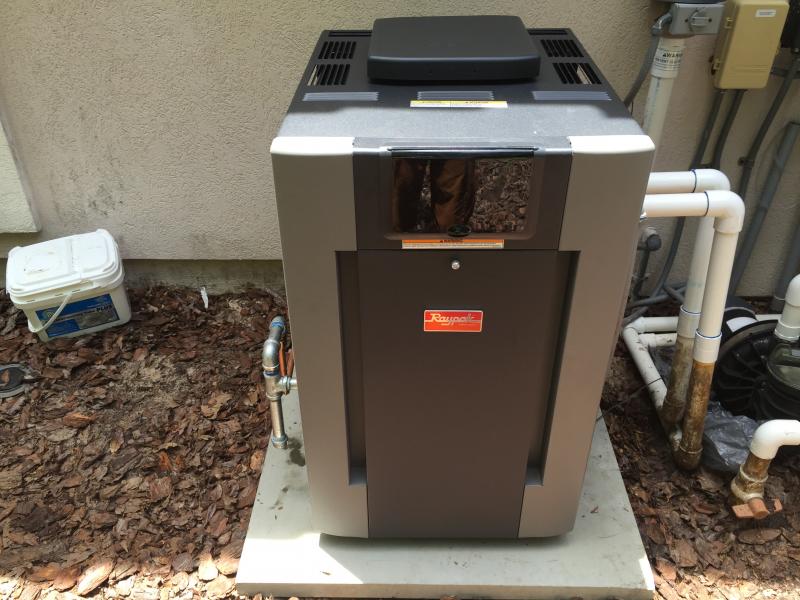


Gas pool heaters offer the fastest heating of all the options in this post. And that makes sense because just like a grill or oven, a gas heater creates heat by burning gas.
But at the same time, they also have the highest monthly operating cost of all pool heating options.
And it’s all for one reason: the heat source, gas
While gas pool heaters offer lower purchase costs, their monthly costs are at least 3x more expensive than the next cheapest option.
This is why most gas heaters are used to heat spas, or as backups for smaller pools. But if speed is your top priority, and you have money to burn (literally), then a gas heater could be right for heating your above ground pool.
Pros of a Gas Pool Heater
- Fastest heating
- Works in all weather
- Cheap initial cost
Cons of a Gas Pool Heater
- Expensive monthly operations costs (3x more expensive than pool heat pumps)
- Short lifespans (less than 8 years)
- Produces harmful C02 emissions
Related: Gas Pool Heater vs Pool Heat Pump
Use a pool heat pump
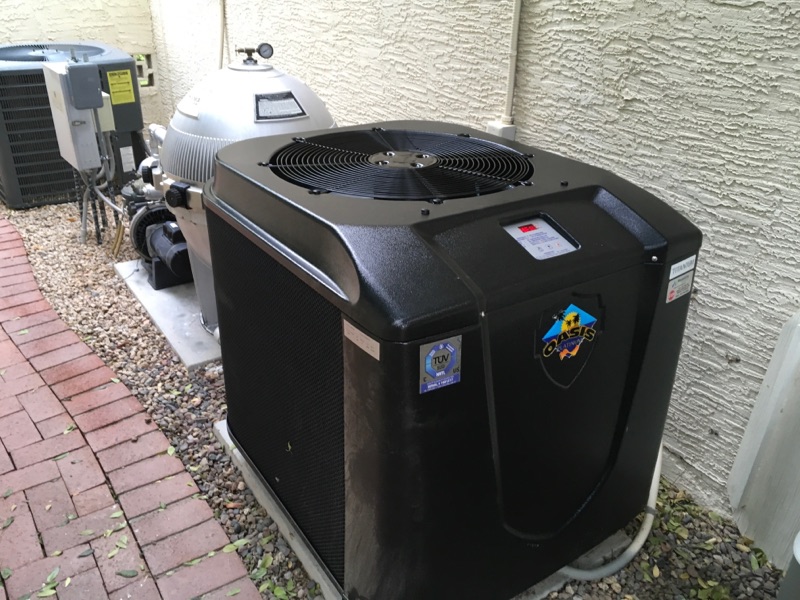


If you’re looking for a healthy balance between speed and cost-effectiveness, look no further than a pool heat pump.
While above ground pool heat pumps warm up water slower than gas heaters, they make up for it with their superior energy efficiency and eco-friendly performance.
But just how energy efficient are we talking?
Well, look at this way:
If heating your pool costs you $300 a month with a gas heater, heating that same pool with a heat pump would cost less than $100. That’s more than a 60 percent savings. Multiply that by one year alone and you’re saving thousands.
Of course, it’s important to know that heat pumps are temperature dependent. While they can generate plenty of heat with or without the sun, they tend to be less effective once outside temperatures drop below 50 degrees.
However, there are more advanced units like the Oasis Platinum, that operate down to the 30s, allowing you to extend your pool season even longer.
And on a related note, when choosing a pool heat pump, look at the BTUs. BTUs are the unit of measurement used to measure power output.
Heat pumps come in a variety of sizes, but the general rule of thumb is, the more BTUs the faster the heating. That said, above ground pool heat pumps are specifically designed for smaller pools, and for this reason, feature lower BTU outputs.
Pros of a Pool Heat Pump
- Most cost effective heating
- Second fastest heating speed
- Works with or without the sun
Cons of a Pool Heat Pump
- Less effective during below 50-degree weather
- Higher initial cost
- Slower than a gas heater
Related: 9 Ways Using a Pool Heat Pump Improves Your Health & Your Life
Use a solar heater
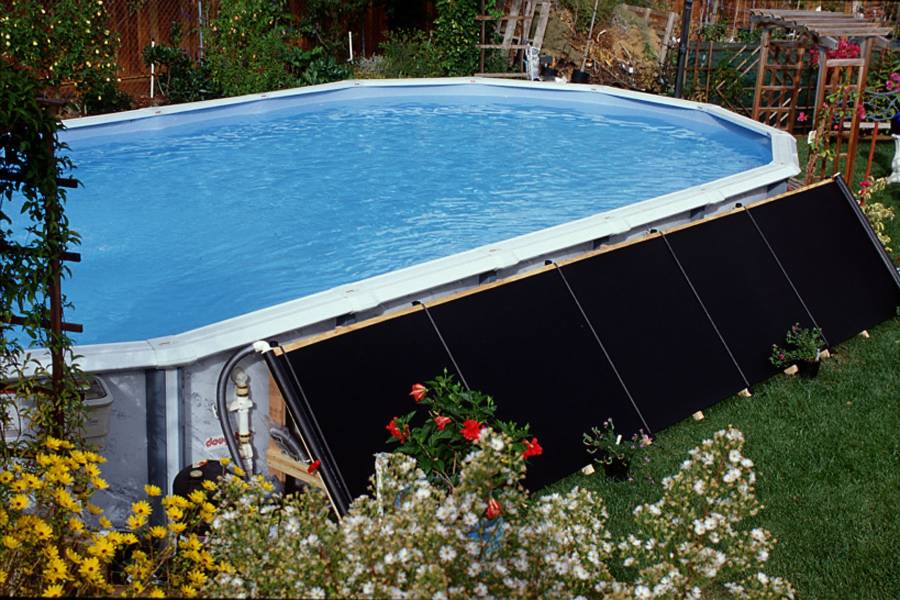


So while the sun by itself might not be enough to keep your pool warm, solar energy just might be.
Solar heaters are another eco-friendly and cost-effective pool heating option. As the name implies, these heater source their heat entirely from the sun. They work by absorbing solar energy through a solar panel array, which connects to and from your pool. With the help of your pool pump, water moves through the solar array, warming up before it re-enters your pool.
Since solar heaters only require electricity from your pool pump, they offer the cheapest monthly operating cost.
On the flip side, solar heaters are the most expensive to install. This is because the process requires multiple steps, from installing the panels to setting up the plumbing
It’s also important to note that solar heaters come with limitations. The biggest one being their dependency on sunlight.
Without several hours of consistent sunlight, a solar heater cannot and will not do its job effectively. So if you ever want to swim on a cloudy day, expect the water to be chilly.
But, if your goal is only to swim a little bit more this season, and you don’t need on-demand heating, then solar heaters can be a great option.
NOTE: If you’re thinking about making a DIY solar heater, check out this post for inspiration.
Pros of Solar Pool Heaters
- Offer the cheapest monthly heating
- Eco-friendly and 100% solar powered
- Great for heating smaller pools
Cons of Solar Pool Heaters
- Slowest heating speeds
- Most expensive initial cost
- Doesn’t work without sunlight
Related: How Well Do Solar Pool Heaters Work?
Use solar blankets or rings
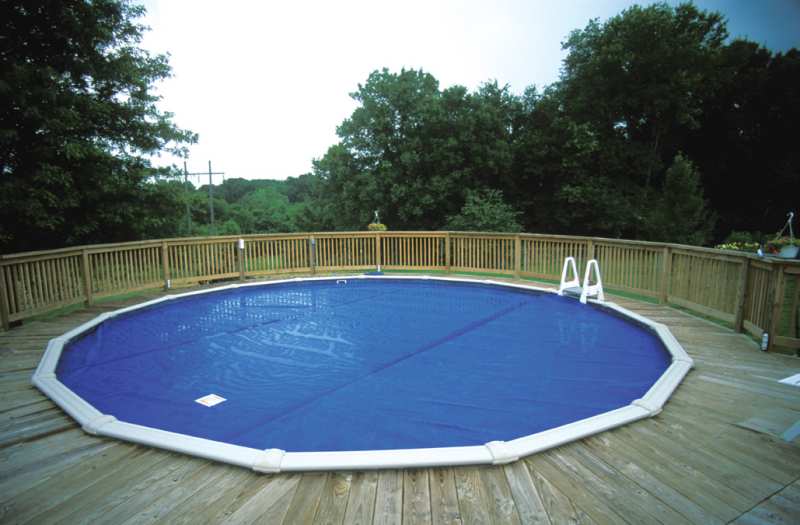


While both solar blankets and solar rings can effectively warm up a pool, think of them more as heating aids.
Why?
Because, by themselves, they simply won’t provide the level of heat and performance you get from a pool heater.
But that doesn’t mean you shouldn’t use them — in fact, it actually costs you more not to. Here’s why:
While we buy pool heaters to keep our pools warm, we sometimes forget why we need them in the first place. Heat loss. If it weren’t for heat loss, the sun would be more than plenty for enjoying a good swim, and heaters would be obsolete. But in this world, that isn’t the case.
So what’s the best solution for reducing heat loss?
Covering your pool.
Using a solar cover reduces evaporation and water loss by up to 70%. And less water loss means fewer chemicals going to waste. All of which spells lots of savings for you.
But let’s not forget that using a cover also helps lock in the heat in your pool. Much like putting a lid on a pot of boiling water.
Bottom line: Solar covers and rings improve heating efficiency.
Since solar covers and pool rings serve more or the less the same function, we grouped them together. Both products work by forming a barrier between your water and the sun.
But if you’re going for efficiency, pick a solar cover. They’re cheap, easy to apply, and simple to replace. Solar rings, while more aesthetically pleasing, tend to be a bit more expensive.
Of course, if you’re the DIY type, you can always make your own solar rings with a black trash bag, a hula hoop, and some tape.
Related: 7 Cheap Ways To Heat a Pool
Pros of Solar Covers and Rings
- Low cost
- Easy to use
- Only requires solar energy
Cons of Solar Covers and Rings
- Doesn’t produce a lot of heat
- Takes a long time to harvest heat
- Can’t heat up an entire pool effectively
Use a wood burning pool heater
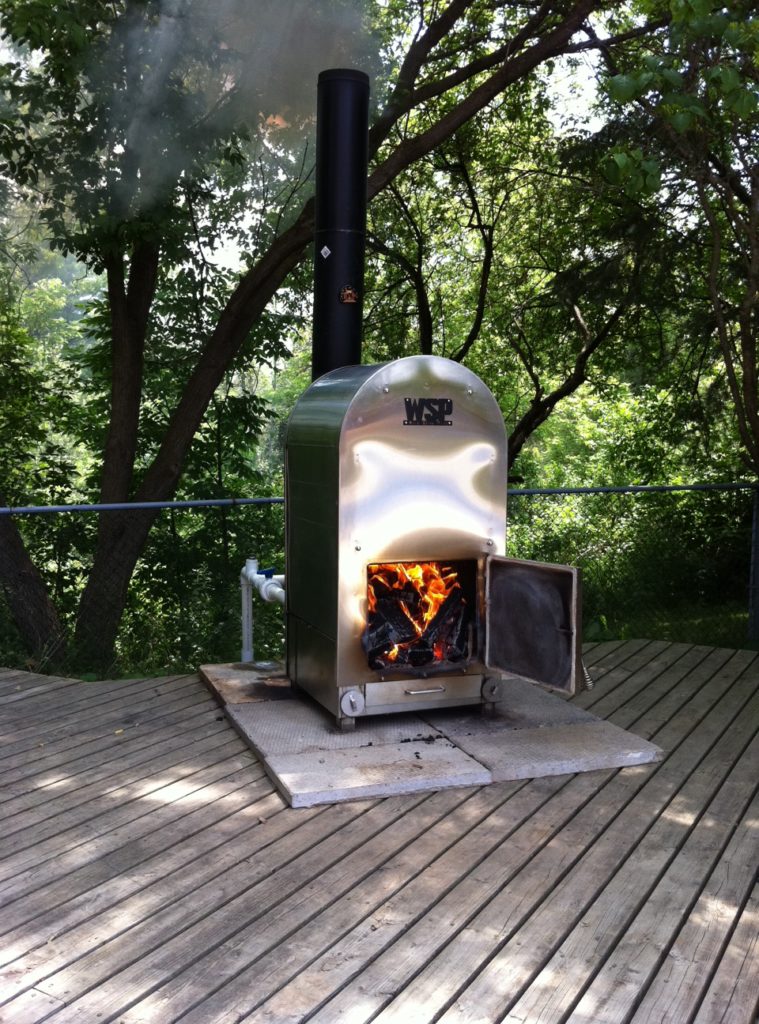


Yes, that’s right, a wood burning pool heater. They exist, and they’re pretty cool.
While most wood pool heaters are DIY or custom built, there are a few manufacturers. The folks at Wood Stove Pools offer a pretty diverse selection.
The heaters work exactly how you would think, by burning wood and transferring that heat to your pool water with the help of your pump. And based on customer reviews, they do the job well.
Of course, it’s important to consider how much wood you’ll need to burn, and how often, to keep your pool adequately heated. And this all depends on the size of your pool and time of year.
Bottom line: when it comes to cost-effectiveness, wood burning pool heaters are behind heat pumps and solar heaters.
This is why most wood burning pool heaters are better suited for spas, small pools, and seasonal use.
Pros of Wood Burning Pool Heaters
- Rustic and aesthetically pleasing
- Simple and easy to use
- Doesn’t involve electronics
Cons of Wood Burning Pool Heaters
- The cost of constantly burning wood is expensive
- Not eco-friendly
- Doesn’t maintain water temperature like gas
or heat pump pool heaters
Deciding how to heat your above ground pool
The best way to heat an above ground pool depends entirely on what you want.
Do you want to heat an above ground pool the fastest? Don’t mind paying the highest prices each month?
Choose a gas heater.
Want reliable heating at an affordable cost? Want to heat your pool at half the cost of gas?
Choose a pool heat pump.
Looking to swim a bit more this season? Don’t mind being limited by the sun?
Go solar.
All of the options listed in this post will heat an above ground. Just remember that some may do it cheaper, faster, or “greener” than others. Although, you might find that using a combination of two or three different heating methods works best for your situation. A few popular combinations include heat pumps and solars heaters (cost-effectiveness), and heat pumps with gas heaters (speed and performance). It all depends what you want to accomplish.
If you liked this post, you might also like:
- How To Open Your Above Ground Pool
- A Guide To Swimming Pool Covers
- Balance Your Swimming Pool Water in 7 Easy Steps

